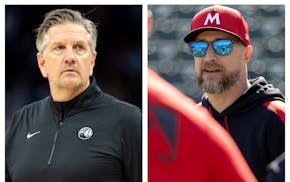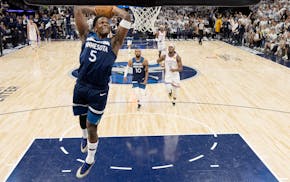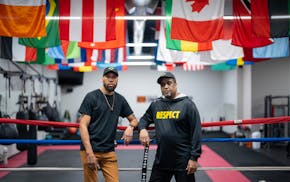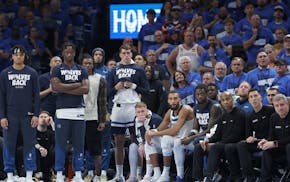The Timberwolves traded for Julius Randle, in part, so Anthony Edwards would have a fellow shot-creator in the team's quest for an NBA championship.
Monday night, in the biggest game of the Timberwolves' season, Randle and Edwards managed to create a crisis.
The Thunder defeated the Wolves 128-126 in Game 4 of the Western Conference finals on Monday night at Target Center largely because the Thunder's two best offensive players, Shai Gilgeous-Alexander and Jalen Williams, combined for 74 points, while Edwards and Randle produced 21.
That's a 53-point differential in a game that was decided by two points.
Edwards took two shots in the first half. Randle made one shot all game.
That's two horrid games from Randle in the last three games of this series.
That's another of Edwards' occasional passive playoff performances.
He didn't shoot often, and when he did, he too often missed from the three-point line, going 1-for-7 from beyond the arc.
Randle finished 1-for-7 from the field and 0-for-3 from beyond the arc.
In an unintentionally symbolic moment, with the Wolves trailing by two and 0.3 left on the clock, Randle inbounded the ball, and threw it short. He was supposed to get it to Rudy Gobert under the rim for a tip-in. Randle was so far off he missed a 7-foot man by 10 feet.
In the grand tradition of Minnesota sports heroes, Edwards and Randle can claim credit for getting the Wolves this far and blame for not getting them further.
Of Edwards, Wolves coach Chris Finch said: "I thought his second half was more aggressive. He got downhill. We got him off the ball a little bit more. He got to the paint. I thought he found some people, made the right plays."
Of Randle, Finch said: "The bench was really, really good, so I rolled with them. They were finding shots for each other, they shot the ball extremely well from the three-point line. … Those are the guys we chose to go with there."
Those were extremely diplomatic answers, which makes sense, because Finch needs Edwards and Randle to right themselves by Wednesday night, when they'll play Game 5 at Oklahoma City.
In their two home games in the Western Conference finals, the Timberwolves shredded the best defensive team in the NBA. Because they won only one of those two games at Target Center, they may not get to play another game at Target Center.
After scoring 143 points in a stunning Game 3 victory, the Wolves on Monday night tried to even the series. At one point in the second quarter, they were shooting an astounding 67% from the field — and were losing by seven points.
Predictably, their Stop-A-Shai defense didn't carry over from Game 3 to Game 4. Gilgeous-Alexander, who was held to 14 points Saturday, had 13 in the first quarter Monday, on his way to a game-high 40 points.
This was predictable because the Thunder are too well-coached to allow the same defensive scheme to shut down their best player again.
So the Wolves had to win this one with offense, and the offense was good enough when the Wolves actually got off shots. Too often, they didn't, because of their 21 turnovers.
Edwards cited those turnovers and the Thunder's offensive rebounding as the difference in the game.
He said he didn't shoot more because of the Thunder's defensive approach, which cut off his drives.
He's never technically wrong when he explains his passivity, but he sometimes misses the point.
These are the games the Wolves need him to lead them to victory.
"They didn't really let me get too many shots off," Edwards said. "They did a good job of that. … So big shout-out to them. …
"I don't look at it like I struggled, or [Randle] struggled — they just had a good game plan."
That sounds reasonable, until you remember that every great NBA player faces difficult defenses and smothering strategies. It's up to Edwards, and Randle, to solve them.

Souhan: Twins' Baldelli and Timberwolves' Finch have a lot in common. They ought to talk.

Souhan: Edwards shows clearly the worth of basketball's key skill — jump shooting

Minnesota sports stars reflect on George Floyd's legacy


